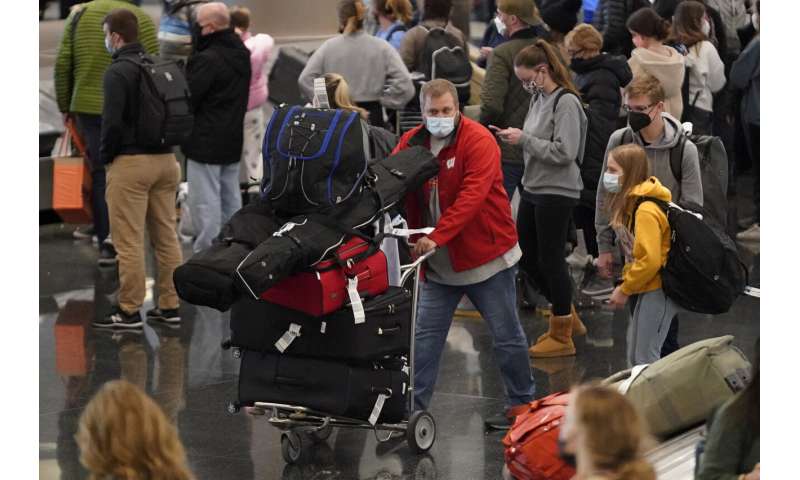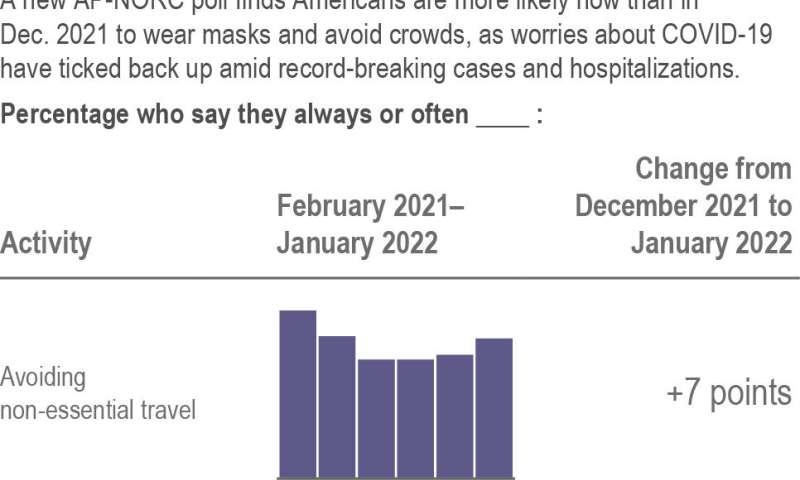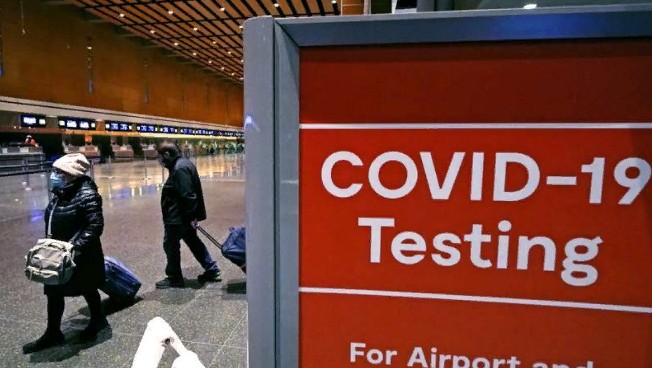Ryan Wilson was careful to take precautions early in the epidemic, wearing a mask, not really interacting, and doing more of his shopping online.
After getting vaccinated last year, the 38-year-old father and seafood butcher from Casselberry, Florida, says he felt a little more at ease. He invited a few friends over and spent more time with his folks, all while still masking up at places like the grocery store.
He hasn’t changed his behavior much as a result of the latest virus outbreak because he’s been vaccinated and has read that the variation produces less severe sickness.
Wilson, like many others, has come to feel that COVID-19 will likely never go away completely.
«It will become endemic, and we will be stuck with it for the rest of our lives,» he predicts. «It’s aggravating, but what can you do?» says the narrator.
Many Americans believe they will «be stuck with it forever,» or at least for a long period. According to a poll conducted by The Associated Press-NORC Center for Public Affairs Research, only 15% of people believe the pandemic will be gone once COVID-19 is largely eradicated. When the pandemic is mostly a mild illness, though, 83 percent say they’ll know it’s gone.
According to the research, 59 percent of Americans believe that getting vaccinated against COVID-19 is necessary for them to feel secure participating in public events.

Travelers pass through Salt Lake City International Airport on Dec. 27, 2021, in Salt Lake City. A new AP-NORC poll shows that few Americans – just 15% – say they’ll consider the pandemic over only when COVID-19 is largely eliminated. By contrast, 83% say they’ll feel like the pandemic is over when it’s largely a mild illness, like the seasonal flu.
However, despite the disturbingly low COVID-19 immunization rates in U.S. children aged 5 to 11, only 37% of parents believe it is critical that their children be vaccinated before returning to normal. Despite the fact that boosters provide much higher protection against COVID-19, particularly the omicron type, than a two-shot course of the Pfizer or Moderna vaccines, just 47% of Americans believe it is necessary to acquire one.
Wilson, who lives in Florida, said that while he is vaccinated, he does not want to vaccine his 5-year-old daughter since he has heard that the chances of healthy youngsters having anything more than cold symptoms are low.
Colin Planalp, 36, a public health researcher in Minneapolis, rushed his 6-year-old son to get vaccinated as soon as he could. «COVID can make kids terribly sick,» he argues, blaming health officials for not making it clearer to the public.
Although children fare better than adults, scientists warn that the virus can cause serious sickness and long-term health effects in children.
According to the poll, more Americans are taking antiviral precautions now than they were before the omicron outbreak.
Overall, 64 percent say they avoid large groups often or sometimes, and 65 percent say they wear face masks with others, up from 57 percent in December. Sixty percent said they avoid unnecessary travel on a regular basis, up from 53 percent a month before. This is the highest level of concern since last spring when millions of Americans were not completely vaccinated.

People eat inside the Siena Pizza restaurant in New York City on Dec. 9, 2021. A new AP-NORC poll shows that few Americans – just 15% – say they’ll consider the pandemic over only when COVID-19 is largely eliminated. By contrast, 83% say they’ll feel like the pandemic is over when it’s largely a mild illness, like the seasonal flu.
Planalp and his wife worked at home for months at a time early in the pandemic, keeping their little kid at home. However, after becoming vaccinated, they were able to go out more, visit family out of state, and even work part-time in the office.
When the delta variant appeared, they increased their security measures. They increased them considerably more using omicron.
«I’ve moved to wear N95 masks since I’m no longer confidence in the standard cloth masks,» Planalp adds. «We’ve decided to cancel our holiday arrangements. My son has been out of school for almost a week, and he will hopefully be able to return in a week. But who knows for sure?»
Planalp, too, does not believe the infection will go away—and does not believe it will become milder: «This isn’t going to end anytime soon. It will change over time, and we won’t be able to foresee how it will alter.»
Americans who have been vaccinated are still considerably more likely to take measures. Seventy-three percent of vaccinated Americans, compared to 37 percent of unvaccinated Americans, said they frequently wear a mask around others.
Unvaccinated David Close, 50, claims he has never modified his behavior. «It’s over for me,» he declares. «I’ve never been afraid of a pandemic in my life.»

A new AP-NORC poll finds Americans are more likely now than in Dec. 2021 to wear masks and avoid crowds, as worries about COVID-19 have ticked back up amid record-breaking cases and hospitalizations.
Close, who relocated to Vonore, Tennessee, in May, says he, his wife, and their two children all contracted COVID-19 in October. He believes his wife contracted the infection at work, but they failed to take the necessary procedures to segregate her from the rest of the family.
«Every night, I got into bed, laid in bed, and fell asleep next to her because that’s what I’ve always done,» he adds.
Close had a fever of around 103 or 104 for around 24 hours before recovering and feeling fantastic in 36 hours, according to him. For around ten days, he lost his sense of taste and smell.
He claims, «I can always make it through a sickness.» «Things like that don’t bother me.»
According to studies, immunization provides further protection against COVID-19, which has killed over 850,000 people in the United States thus far.
Jamie Costello, a 57-year-old math teacher and mother of eight from Minersville, Utah, has not been vaccinated—not because she is anti-vaccine, but because she has had serious responses to flu shots in the past and has recovered from COVID-19. Costello, like many other Americans, believes that COVID will become as common as the flu.

Waiter Juan Rodrigues, left, asks a customer to show his vaccination card before being allowed to sit inside the Fred 62 restaurant in the Los Feliz neighborhood of Los Angeles, on Nov. 29, 2021. A new AP-NORC poll shows that few Americans – just 15% – say they’ll consider the pandemic over only when COVID-19 is largely eliminated. By contrast, 83% say they’ll feel like the pandemic is over when it’s largely a mild illness, like the seasonal flu.
«It’s a virus that mutates really quickly,» she says. «Instead of just the flu season, we’ll have to finally say, «Well, it’s the flu and COVID season.» It’s simply there, and we need to get back to normal as soon as possible.»






Be the first to comment on "Will the virus be declared ‘over’?"